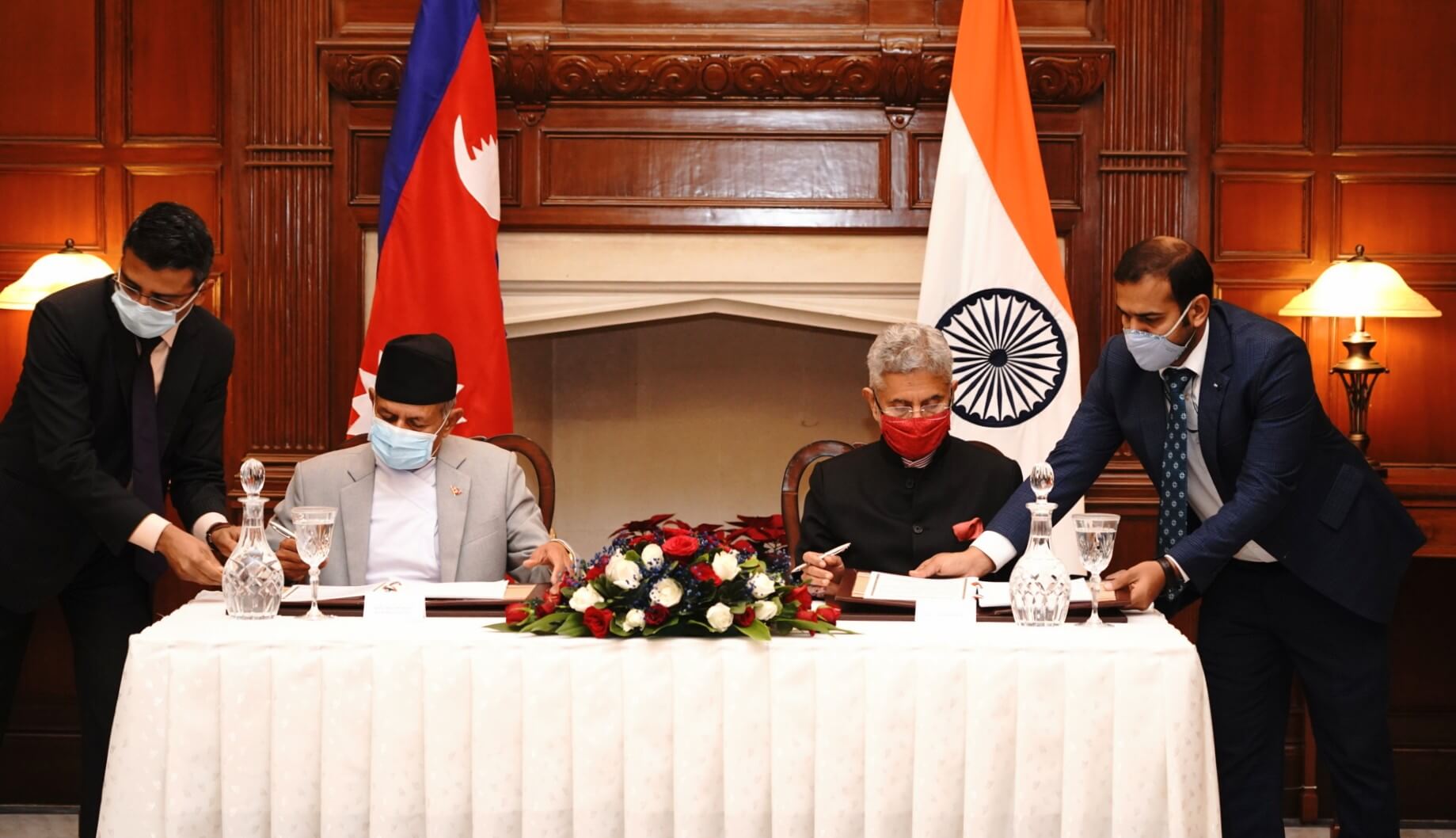On Friday, Indian Foreign Minister S. Jaishankar and his Nepalese counterpart Pradeep Kumar Gyawali co-chaired the sixth meeting of the India-Nepal Joint Commission. The two were accompanied by their respective Foreign Secretaries, Harsh Vardhan Shringla from India and Bharat Raj Paudyal from Nepal.
During the meeting, the leaders discussed several areas of bilateral cooperation. According to a statement released by the Indian Ministry of External Affairs, the areas on which the two agreed to bolster their partnership included “connectivity, economy and trade, power, oil and gas, water resources, political and security issues, border management, development partnership, tourism, culture, education and capacity building.”
Amidst the ongoing tensions between the two countries, they also discussed ways to strengthen their “traditionally close and friendly ties”, specifically in fighting against the impacts of the COVID-19 pandemic. Consequently, the Indian side vowed to assist Nepal in meeting its demand for the COVID-19 vaccine. India has also taken it upon itself to prioritise the supply of the vaccines to its neighbouring countries, which include Bhutan, Bangladesh, Myanmar, and the Maldives.
Furthermore, the leaders emphasised on the importance of promoting “cross border movement of people and goods.” Alongside bilateral trade, they also agreed to enhance cooperation on regional, sub-regional and international issues, with Nepal pledging its support to India’s bid to expand the United Nations Security Council and gain permanent membership.
On Saturday, the final day of his three-day visit, Gyawali met with Indian Defence Minister Rajnath Singh. According to a statement by the Indian Ministry of Defence, Singh “conveyed his personal connect, long association with [the] leadership and special regard for the people of Nepal.” Sources say that Singh was representing India Prime Minister Narendra Modi, who could not meet with Gyawali as he was preoccupied with the COVID-19 vaccine roll-out, which commenced on Saturday.
However, Gyawali’s visit was not completely successful. His request to work towards the resolution of the ongoing border dispute was not accepted by the Indian side. India and Nepal’s boundary tensions were instigated in November 2019 by the Nepalese government’s decision to issue a map that included Kalapani-Lipulekh-Limpiyadhura regions within its territory. The endorsement of the new political map followed India’s inauguration of a road link via Lipulekh, a territory that Nepal has long claimed as its own. Kathmandu raised the chorus over the issue in May last year, when India’s defence minister Rajnath Singh inaugurated a new road from Dharchula to Lipulekh that will reduce the time taken for the Kailash Mansarovar pilgrimage. The road also means that 84% of the pilgrimage journey will now be undertaken in Indian territory and 16% in China. Earlier, 80% of the journey took place on foreign land.
Speaking to journalists on Saturday, Gyawali said, “Nepal wants to resolve this problem so we can have an undisputed, peaceful, stable boundary. These are issues awaiting discussion and interaction from the leadership, so that we can focus on the future free from historical baggage for the future generations.” Further, speaking at the Indian Council of World Affairs, he said, “We started the demarcation and mapping of the boundary since 1981. At that time, Joint Technical Committee was founded which has tenure till 2007. It produced 182 strip maps which depict the border … but for various reasons [work on] two segments – Susta and Kalapani – were not completed. If we talk of the overall boundary between Nepal and India, it is a smaller segment. However, it is an unfinished work and that’s why we are talking of the need and urgency of finalising and finishing those segments as well.”
However, official sources said that India continues to be unhappy about the Oli government’s decision to amend its map to include the abovementioned Indian territories. This issue continues to discourage the Indian side from negotiating with Nepal. India’s continued discontent with the Nepalese side was indicated by the fact that Narendra Modi did not convene a meeting with Gywali, despite Oli making it repeatedly clear that the border issue was the prime focus of the Nepalese leader’s visit. However, Gyawali’s visit indicates that India is willing to engage with the Nepalese government on other issues, despite their ongoing tensions.
This meeting was crucial for Nepal to mend ties with India, specifically since the Nepalese government faces a domestic political crisis spurred by intra-party opposition that led Oli to dissolve the country’s Parliament. While India has chosen to keep out of the issue, which it believes to be a matter of Nepalese domestic politics, its arch-rival China has been working closely to keep the ruling Nepalese Communist Party intact.
India, Nepal Seek to Revive Ties, Hold Joint Commission Meet
Nepalese Foreign Minister Pradeep Kumar met with Indian External Affairs Minister S Jaishankar at the Joint Commission meeting last week, during which the two countries reviewed areas of cooperation.
January 18, 2021

SOURCE: TWITTER
